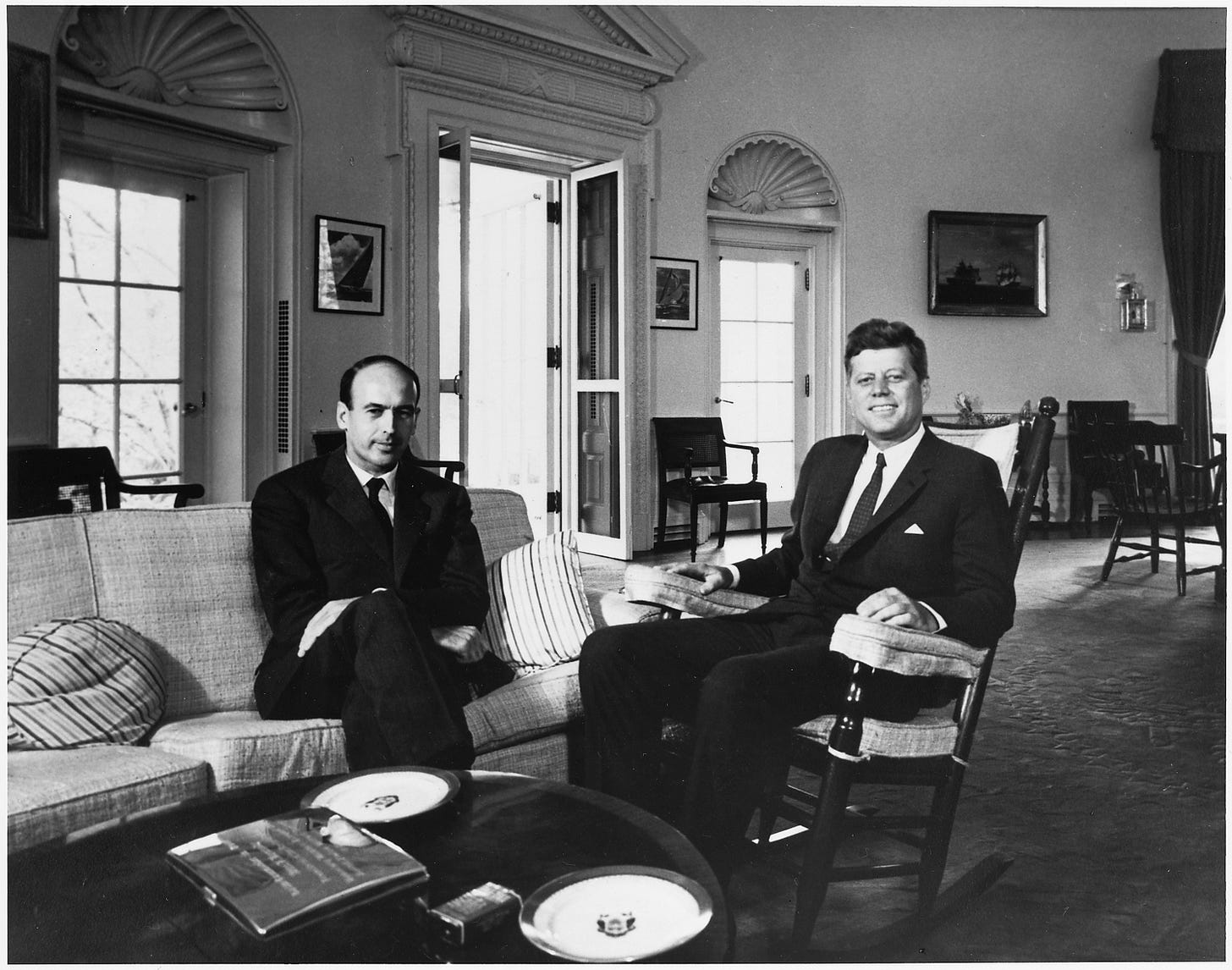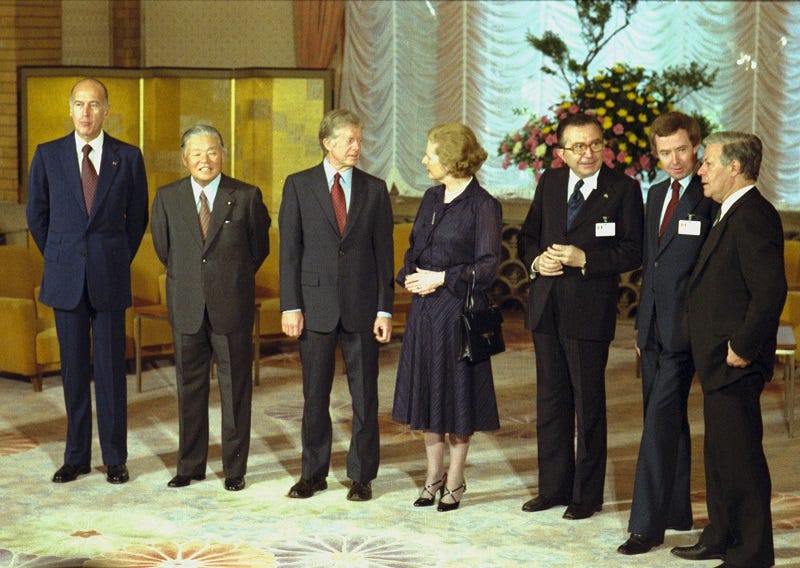Changing France in the 1970s
Fifty years ago, Valéry Giscard d'Estaing set out to modernise France
Earlier this week was the 50th anniversary of Valéry Giscard d’Estaing taking office as president of France.
Giscard, often referred to as just VGE, was from the centre-right of politics. Despite this, he was surprisingly progressive in some of his policies. Under his presidency, abortion became legal, divorce became easier and the voting age was reduced from 21 to 18.
When he took office on 27 May 1974, Giscard was 48 years old. Following the presidencies of General de Gaulle and Georges Pompidou, Giscard was seen as a young and modern leader.
It wasn’t just his age that gave this impression. It was also his style of campaigning. Giscard drew inspiration from American president John F Kennedy, whom he met just once on a visit to the US in 1962 when he was finance minister.

The Kennedy style was so inspiring to Giscard that he sent members of his team to the US to learn what they could about modern political marketing.
One of the results was the involvement of his young family in his communications. In this campaign poster, he is seated with his daughter, Jacinte.
As veteran political commentator Alain Duhamel said in an interview with radio station France Info, this style of politics was totally new in France and made him “the first candidate to campaign with his family.”
"C'est la nouveauté absolue, il est le premier candidat à faire campagne en famille."
Alain Duhamel, France Info
Other tools in the campaign toolbox included a fresh slogan, Giscard à la barre, Giscard at the helm, and a string of endorsements from popular celebrities including Brigitte Bardot, Johnny Hallyday and Charles Aznavour.
Another innovation in the tight race between Giscard and his Parti Socialiste opponent François Mitterrand was a televised debate. While the debate is now a staple of the French presidential election, back then, it was completely new. Giscard leapt at the opportunity as he felt comfortable on screen and thought he would do better than Mitterrand.
In the end, both candidates performed well, but Giscard had the edge with a famous line that has entered the political lexicon. “You do not have a monopoly of the heart,” he said in response to Mitterrand’s attempt to present his programme as the one that was more caring.
“Vous n’avez pas le monopole du cœur”
Valéry Giscard d’Estaing, presidential debate, 10 May 1974
The race was tight and Giscard won by fewer than 500,000 votes. On the day he took office, he took the modern step of walking to the Elysée Palace, rather than being driven in an official car. Note that Gabriel Attal did the same thing in January this year when he walked from the Education Ministry to the Hotel Matignon to take up his new role as prime minister.
Giscard wanted a reforming, modernising and liberalising government. He appointed a woman, Simone Veil, to the important role of minister of health. She pushed through the legislation to make abortion legal, often in very difficult circumstances.
Despite the successes, Giscard was ultimately unable to secure a second term in office. There were three main reasons. First, his time in office coincided with a global economic downturn that pushed up inflation and unemployment. Second, his first prime minister, Jacques Chirac, turned against him by resigning and challenging him in the 1981 presidential election. Finally, Giscard became ensnarled in the so-called diamonds affair, l’affaire des diamants, after allegations surfaced that he received gifts of diamonds from the president of the Central African Republic, Jean-Bédel Bokassa, while finance minister. Despite attempts to explain the affair away, it left a nasty stench that clouded his 1981 re-election campaign.
His opponent in 1981 was François Mitterrand again who then occupied the presidency for 14 years until 1995.
I met Giscard myself when I was working for the BBC in Paris in 2007. I was sent to record an interview with him in his private office in Paris. I was met by his secretary before being ushered into a large office that looked as if it had been lifted straight from the late 1970s. On the walls were pictures of the former world leaders with whom Giscard had worked including Jimmy Carter, Margaret Thatcher and Helmut Schmidt.

He spoke good English, was courteous throughout and gave me a signed copy of his autobiography as I left. I stepped back into the busy Boulevard Saint Germain feeling as if I had just emerged from a time machine.
It was in the same office where another journalist claimed to have had a very different experience. German reporter Ann-Kathrin Stracke says the former president repeatedly touched her buttocks while posing for photographs after an interview in 2018. Giscard always denied the allegation. She filed a complaint in 2020 but Giscard died later that year.
As for his legacy, Giscard does not stir strong emotions on either side. An opinion poll by the research institute IFOP in 2021 asked people which French president they liked the most. Charles de Gaulle topped the list with almost a third (31%) naming him. Jacques Chirac was second (19%) and François Mitterrand third (18%). Giscard was the choice of just 4%, slightly ahead of Georges Pompidou on 3%.
Giscard is survived by his wife, Anne-Aymone Giscard d’Estaing. She has always remained discreet although gave an interview to Le Figaro on the anniversary of the 1974 presidential election. She said her husband’s legacy had been deliberately downplayed by her husband’s successors. Describing her husband’s character, she said he was both inspired by traditional values while also being committed to modernising France.
Il y avait sûrement en effet une dualité dans sa personnalité. Une éducation très classique, inspirée par les valeurs traditionnelles de la France, mais en même temps, un engagement sincère à mettre la France sur la voie du progrès.
Anne-Aymone Giscard d’Estaing, interview with Le Figaro, 4 May 2024
Links
Giscard’s communication strategy (French) https://www.francetvinfo.fr/politique/mort-de-valery-giscard-d-estaing/comment-valery-giscard-d-estaing-a-casse-les-codes-de-la-politique-en-1974-c-etait-la-premiere-campagne-moderne_3552479.html
Creating the Giscard à la barre slogan (French) https://www.francebleu.fr/infos/politique/giscard-et-la-normandie-c-est-la-qu-est-ne-le-celebre-slogan-giscard-a-la-barre-1607011205
German journalist accuses former president of sexual harassment (English) https://www.bbc.co.uk/news/world-europe-52631041
Interview with Anne-Aymone Giscard d’Estaing (French) https://www.lefigaro.fr/politique/anne-aymone-giscard-d-estaing-la-france-n-est-plus-un-grand-pays-20240504
Favourite presidents opinion poll https://www.ifop.com/wp-content/uploads/2021/05/118041-Presentation-V3.pdf






Interesting to see the assembled premiers. Jimmy Carter is still flying the liberal flag, at least.
Fascinating account of your personal meeting.